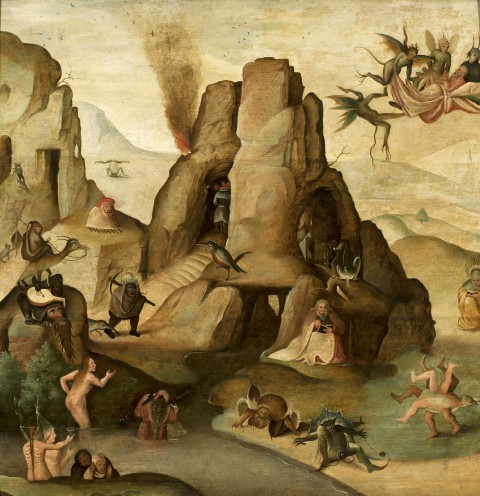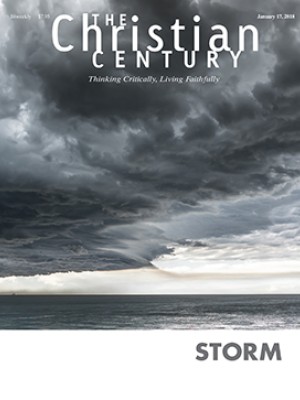Psalm 91 in every time and place
“No evil shall befall us,” said St. Anthony in the desert, preachers during the Rwandan genocide, and Americans after 9/11.

Cast yourself down from this high place, said the devil to Jesus. Don’t you know the scripture? asked Satan. God’s angels will protect you, so that you won’t dash your foot against a stone.
Satan is quoting Psalm 91 here, but modern readers may not appreciate the multiple ironies of the text. In Jesus’ time, that very psalm had long been one of the most powerful weapons in the arsenal of Jewish exorcists. In this instance, though, the devil himself is quoting it. Hearing that speech is rather like seeing a modern cinematic vampire waving a crucifix. Today this ancient psalm enjoys unprecedented popularity around the world, and for very much the same reasons as in the earliest church.
Psalm 91 has supplied both Jews and Christians with a refuge in time of trouble of all kinds, including supernatural assault, deadly plague, and worldly violence. It imagines the believer surrounded by threats but nevertheless passing through unharmed, defended by angels. Thus girded, the faithful may tread on supernatural enemies—lions and serpents—yet remain secure. Through much of Christian history, the psalm retained the element of exorcism, and its words commonly appear on amulets and inscribed on buildings. Right up to the 19th century, legends told of pious Christians who used the prayer to survive epidemics that killed thousands. As the psalm promises, “A thousand may fall at your side, ten thousand at your right hand, but it will not come near you.” For obvious reasons, this is also known as the Soldiers’ Psalm.
Read our latest issue or browse back issues.
In the United States, this psalm is still among the most frequently invoked Christian scriptures, especially in time of warfare. It was much quoted after the 9/11 attacks. The psalm has acquired a whole new life in the churches of Africa and Asia, which find a powerful resonance in the promise of protection from spiritual evil. The reference to deadly serpents has an additional power in tropical regions where snakes and other deadly creatures are a far more familiar quantity than in the north, giving it a special relevance to the comparison with diabolical forces.
The African love affair with Psalm 91 can be traced back to the ancient Coptic churches. St. Antony, the third-century Egyptian founder of monasticism, used the psalm to scatter those demonic enemies who manifested as lions and serpents. Modern Africans likewise treasure the text. In the words of the Africa Bible Commentary (2006), “Danger can be very real in Africa. Many face threats from natural forces like the heat and from human sources such as civil wars and riots. This psalm speaks of God delivering us from danger and gives us an assurance of finding our protection and salvation in him.”
The psalm is everywhere in African life, used for exorcism and spiritual protection, and the written text occasionally serves as a kind of amulet. As Nigerian scholar David T. Adamo notes, the Bible offers many promises of protection, “but in Psalm 91 all the promises seem to be brought together in one collection, and [form] a covenant.”
Preachers and ministers deploy the psalm during any major conflict or catastrophe, such as the Rwandan genocide of 1994, the Indian Ocean tsunami of 2004, or terrorist violence. The phrase “I pray Psalm 91 over . . .”—referring to a particular city or nation—has become a reflexive response to disaster. Following such invocations, preachers commonly recount stories of individuals who recited the psalm at moments when all hope was seemingly gone, yet who miraculously survived.
Apart from times of crisis, preachers pray the psalm in daily struggles against spiritual evil. Of course, the psalm is popular among faith-healing churches such as the Nigerian Aladura, but it has wide currency across the denominational spectrum. Many churches recommend the psalm to believers for all manner of special occasions, and African reference Bibles strongly highlight it for its special potency. It is widely invoked for its healing powers and for bringing prosperity and success.
In the celebrated Brazilian crime film City of God, the psalm is declaimed as a gangster reforms and turns to the church, and we see him passing unharmed through his enemies—in this instance, police detectives and rival criminals. Psalm 91 is the title of a recent production from Nigeria’s vigorous evangelical film industry, which depicts struggles between holy pastors and the demonically possessed. A global history of Psalm 91 would summarize some critical themes in Christian history regarding healing, possession, angelic powers, and spiritual evil—themes that are far from extinct.
A version of this article appears in the January 17 print edition under the title “The travels of Psalm 91.”







